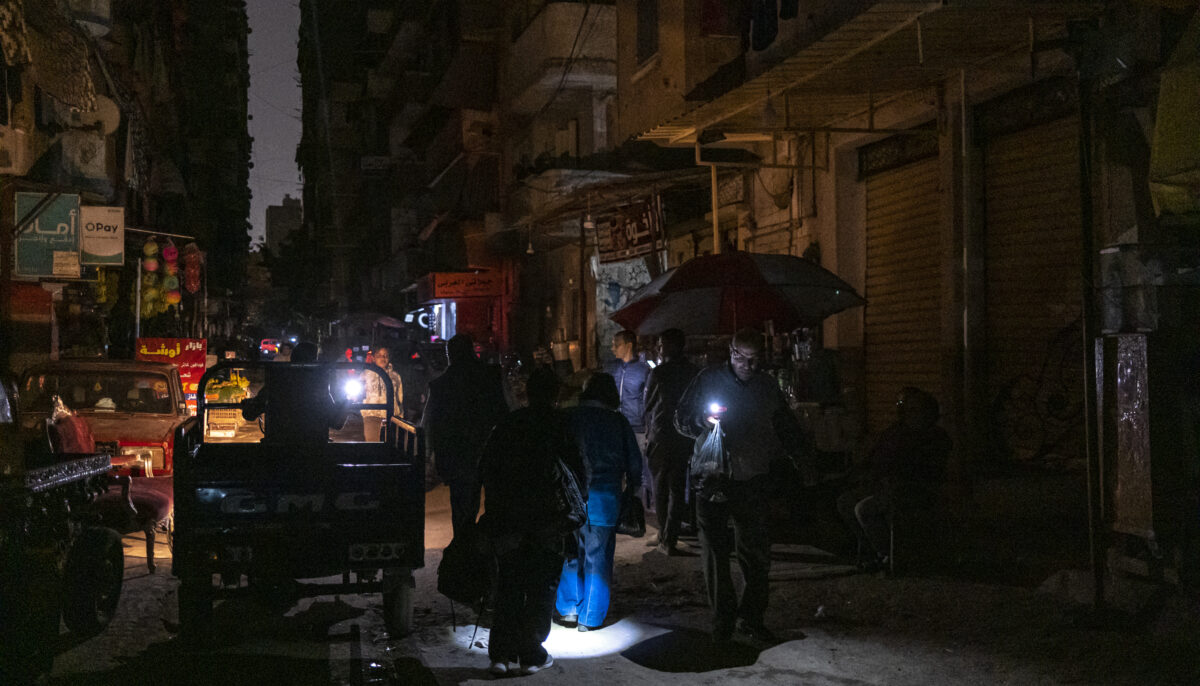Egypt has faced a notable power outage since last July due to the government’s “load shedding” initiative. Responding to increased electricity demand driven by higher temperatures and widespread use of air conditioning, authorities implemented daily power cuts lasting one to two hours to curb consumption rates.
In September, officials assured the public that the electricity crisis would be resolved by October 2023. While there was a brief respite during this period, the outages resurfaced at a similar intensity, attributed to two primary reasons. Firstly, the Israeli aggression on Gaza disrupted the passage of Egyptian gas exports destined for the occupied territories. Secondly, gas supply to production stations was reduced to maximize gas exports instead, impacting the duration of the electrical supply.
Against this backdrop, the Egyptian government extended the duration of the power outage, this time adding two extra hours until a sufficient supply of gas and diesel was secured. The decision is slated to affect all governorates, each adhering to its own schedule.
This unfolding reality, anticipated to see a shift in March according to official sources, has sparked discontent and frustration among many individuals. The repercussions are particularly felt by a substantial segment of remote workers who now grapple with internet disruptions due to the prolonged power cuts. Consequently, they cannot submit projects and meet deadlines, forcing them to work beyond conventional hours once power is restored.
Israa Hafez, residing in Minya Governorate, serves as an executive director in a UAE-based company, working from 9:00 AM to 6:00 in the evening. However, the daily electricity cutoff from 4:00 PM to 6:00 PM in the afternoon has significantly disrupted her work routine, impeding her ability to complete assigned tasks on time.
In an interview with SMEX, Hafez expressed her challenges, stating, “I eagerly await the end of the two hours of power outage every day so I can resume working. However, this comes after a period of wasted time, mental distraction, and an extension of my actual working schedule by two hours. I work into the late hours of the night, feeling the impact on my social life; I feel limited in what I can do even after work.”
Hamza Selim, hailing from Aswan Governorate, shared with SMEX the challenges he encounters while working remotely in the American land transportation sector. The daily power outages have a direct impact on his work, which involves “completing deals through specific sites, requiring a stable and fast internet service.” The nature of his work demands a seamless online experience, as even a few seconds of disruption can result in the loss of crucial deals.
To address this issue, Salim invested in an expensive computer and subscribed to a large, costly internet package. However, for unknown reasons, he found that over-the-air internet does not offer the same services, with certain sites like Skype being blocked within Egypt.
Frustrated, Salim attempted to contact Vodafone Communications Company multiple times to seek clarification on the blocked sites. However, his inquiries were consistently met with disapproval, with the company claiming ignorance about the blocked sites and asserting that it was an unintentional mistake.
The power outage significantly impacts all individuals reliant on the internet for their work, extending beyond regional employees to those collaborating with companies operating within Egypt. This challenge has become more pronounced with the accelerated shift towards remote work and increased dependence on the internet following the COVID-19 pandemic. Consequently, many online workers find themselves at a disadvantage.
According to a report by DataReportal, in 2022, Egypt had 75.66 million landline internet users and approximately 98.29 million mobile phone users at the beginning of the year. Another report from Fin Tech Egypt, supported by the Central Bank of Egypt, revealed that the number of remote workers in Egypt reached 6 million individuals in 2023, constituting around 10% of the total workforce in the country.
In an interview with SMEX, Dr. Mohamed Salah, former CEO of the New and Renewable Energy Authority (NREA) and founding CEO of the Egyptian Electric Utility and Consumer Protection Regulatory Agency, shed light on the root causes of the power outages that started in July during an interview. According to Dr. Salah, the initial wave of power disruptions was due to engineering problems, leading to a decline in the efficiency of gas stations.
Dr. Salah explained that the outages resurfaced, this time as a deliberate measure to curtail gas consumption and redirect it for export, enabling authorities to capitalize on financial compensation. This decision became imperative for Egypt, particularly in the face of the global energy crisis arising from the Russian-Ukrainian war and the Israeli aggression against Gaza.
Despite the varied specializations and diverse fields of work among remote workers, the impact of power outages is uniformly significant, often extending to job loss and damage to electronic devices they rely on for their work.
Mohamed Ibrahim, a young resident of Cairo, found himself amid a challenging situation as a remote communication site administrator for an Emirati company, working on a freelance basis. Unfortunately, the company terminated his employment contract due to his unavailability during specified hours and inability to fulfill work requirements resulting from power outages and a lack of internet service. Ibrahim’s experience is just one among many, reflecting the bitter reality faced by employees who have lost their livelihood due to the ongoing crisis.
In addressing potential solutions, Dr. Salah emphasizes the need for the state to increase reliance on sustainable and wind energy for large projects. He suggests the utilization of electricity generators or those powered by renewable energies after conducting thorough feasibility calculations, considering the challenges posed by the high costs attributed to the surge in dollar prices.
On an individual level, Dr. Salah recommends the installation of UPS devices by employees who depend on the internet for their work. However, he acknowledges that this solution may not be affordable for everyone, given the challenging living conditions endured by many Egyptians.
The persistent power outage has resulted in significant losses for Egypt over several months. Despite the government’s promises to prioritize the digital economy as the “locomotive of sustainable development,” no official figures or reports have been made available to assess the reality of the country’s digital sector and the losses it incurs amid the successive crises. The current situation contradicts the government’s commitment to bolstering this crucial sector.



